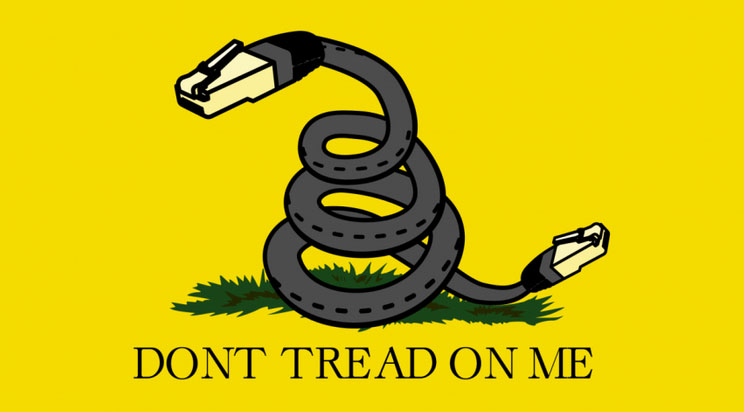
Some Corridor businesses and content producers remain unconvinced internet of the future will be equal and open. IMAGE REDDIT
By Katharine Carlon
[email protected]
Though area internet providers insist last December’s repeal of net neutrality rules won’t negatively impact their customers, some in the Corridor aren’t buying it and worry eliminating utility-style regulations that ensured all traffic shared the same superhighway will keep smaller businesses in the slow lane.
The Federal Communications Commission voted 3-1 on Dec. 14 to repeal Obama-era rules requiring internet service providers (ISPs) to offer equal access to all web content without charging users for higher-quality delivery or giving preferential treatment to certain websites.
Representatives of both Mediacom and North Liberty-based South Slope say they have no intention of blocking, throttling or requiring users to pay extra for faster service – three previously prohibited practices that are now, theoretically, allowed.
“We’re highly regulated and we have to follow the rules, but that won’t deter us on how we do business,” South Slope CEO Chuck Deisbeck said. “Users should get what they pay for.”
Tom Larsen, senior vice president of government and public relations for Mediacom said his company, too, planned to continue doing business as usual “regardless of what the rules say.”
But not everyone believes ISPs will follow through on their pledges to continue upholding net neutrality with so much temptation to tier pricing or favor traffic to partner companies. Comcast, for example, which ran prominent ads in the lead-up to the FCC decision vowing support for “an open internet,” spent millions lobbying to kill the regulations.
“I hate to see this open and free market go away and I don’t trust these large companies,” said Aaron Warner, founder and CEO of ProCircular, a Coralville-based cybersecurity firm. “It’s bad policy and it’s bad for business. Netflix, Hulu, Amazon – they can afford to pay whatever and will just pass the costs onto their customers. Small businesses will ultimately lose because they aren’t going to be able to pay for access to a level playing field.”
Mr. Warner said the U.S. has already experienced a world without net neutrality: the era of dial-up internet when companies like AOL ruled the cyber roost.
“You got to choose between five or six buttons of where to go. And what a coincidence, the places you could go happened to coincide with the services they offered.”
Guy Wendler, president and CEO of Cedar Rapids-based Stamats Communications, said he was “trepidatious” on how small- to mid-sized media companies like his would fare in the post-net neutrality era.
“Will it be set up like on an airplane with comfort class, economy and first class? Does it mean people in the back don’t get peanuts?” he said. “Whatever happens, it’s going to be a new world.”
Mr. Wendler said tiered service could harm companies like Statmats, which count specialized audiences in the hundreds of thousands instead of the millions enjoyed by the New York Times and other media behemoths. He also likened the situation to the U.S. Postal Service, which practices neutrality with educational content “whether you send something to the next state or Anchorage, Alaska,” but zones advertising content, charging different rates depending on distance.
“We’ve always been an advocate of public policy that promotes widespread dissemination of content without discrimination,” he added, predicting the current environment would lead to “a bit of the Wild West for a while until we see who the winners and losers are. Then we may go back to some kind of regulation.”
Mr. Larsen agreed that the road ahead may be wild and bumpy, but not for the reasons net neutrality advocates believe: “The truth is,” he said, “networks today are not neutral in the way consumers think they are.”
“Edge providers like Google, Facebook, Twitter and Netflix are already making sure prioritization is happening. When you do a Google search for cars, [Google] is going to prioritize those who paid to advertise. I think what this FCC has recognized is people are fooling themselves that the net is neutral when it’s not. … Nobody should be able to discriminate, but if we can’t do that, we should have a free-for-all and let the market decide.”
While cable companies are being portrayed as greedy and manipulative, Mr. Larsen continued, the real issue is the rise of giant companies like Google and Netflix, which together account for 50 percent of the customer traffic. That has required providers like Mediacom to build private pathways outside the main lanes of the internet to route traffic to their private networks.
“We built private roads to their networks so everybody else can travel on the highway unimpeded. It’s good because we’ve added more public road, but those companies are always going to have the HOV lane. They got themselves the very special seats.”
Far from protecting the small businessman or the garage innovator, net neutrality played de facto favorites, Mr. Larsen argued, making it impossible anyone could ever grow large enough to compete.
“And the great con is they [the internet giants] wanted to ensure no one could charge them for prioritizing their traffic, so they would forever have private networks they weren’t paying for,” he said.




